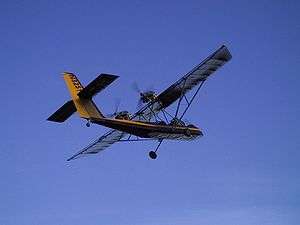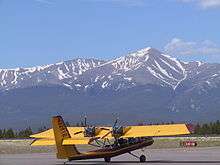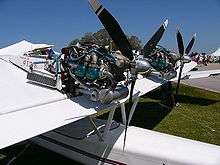Lockwood Aircam
The Lockwood Aircam (also called the Air Cam and AirCam) is a high-wing, twin engine pusher configuration aircraft with conventional landing gear, based on the single engine Lockwood Drifter and sold in kit form by Lockwood Aircraft. The open-cockpit aircraft seats two in tandem. As of 2019, 250 Aircams were licensed and flying.[1] In 2019, a complete kit with Rotax 912ULS engines, less instruments, paint, shipping and crating was priced at US$128,990.[2][2][3][4][5]
| Lockwood Aircam | |
|---|---|
 | |
| Role | Kit aircraft |
| National origin | United States |
| Manufacturer | Lockwood Aircraft |
| Designer | Phil Lockwood |
| First flight | 1995 |
| Introduction | 1995 |
| Status | In production |
| Produced | 1995-present |
| Number built | 250 (2019)[1] |
| Unit cost | |
| Developed from | Lockwood Drifter |


Design and development
The first prototype Aircam was built in 1995. Designed by Phil Lockwood, founder of Lockwood Aircraft, it was built for the National Geographic Society for research and photography in the Ndoki Rain Forest in the northern Congo Basin. It was built to fly low and slow and to provide a wide, unobstructed view, with the additional security of a second engine. The design has since been improved while retaining the same layout.[4][5][6][7]
The initial version, produced by Leza-Lockwood Corporation, was powered by twin Rotax 582 powerplants of 64 hp (48 kW) each. Twin 80 hp (60 kW) Rotax 912 and 115 hp (86 kW) 914 engines were optional. Later the 582 was eliminated, the 912 engine became standard and Leza-Lockwood's name was changed to Lockwood.[4][7][8] In 2015, an optional bubble canopy kit was introduced.[9] The aircraft can also be configured with floats to become amphibious.[10]
The Aircam was designed to be able to take-off on one engine if needed and the positioning of the engines close to the centreline contributes to this capability as well as its benign single engine handling.[7][8]
The Aircam has a landing roll of 300 feet and a takeoff roll of under 200 feet.[11]
Accidents and incidents
The United States National Transportation Safety Board (NTSB) lists eight accidents involving Aircams between 1993 and February 2010. In these eight accidents, there was one fatality, one serious injury, one minor injury and seven people uninjured.[12]
Jack Roush of NASCAR team Roush Fenway Racing nearly lost his life after the Aircam he was flying struck a power line and sank in a lake near Troy, Alabama in April 2002. He was saved in a dramatic rescue by retired U.S. Marine Larry Hicks.[13]
Specifications (Aircam)
Data from Lockwood Aircraft website[11]
General characteristics
- Crew: one
- Capacity: one passenger
- Length: 27 ft 0 in (8.23 m)
- Wingspan: 36 ft 0 in (10.97 m)
- Height: 8 ft 4 in (2.54 m) to top of vertical stabilizer
- Empty weight: 1,040 lb (472 kg)
- Gross weight: 1,680 lb (762 kg)
- Fuel capacity: 28 US gallons (106 litres)
Performance
- Cruise speed: 100 mph (160 km/h, 87 kn)
- Stall speed: 39 mph (63 km/h, 34 kn)
- Never exceed speed: 110 mph (180 km/h, 96 kn)
- Range: 340 mi (550 km, 300 nmi) at 70 mph (113 km/h)
- Endurance: 6 hours
- Rate of climb: 1,500 ft/min (7.6 m/s) on both engines, 300 fpm on one engine
References
- Dave Hirschman (28 March 2019). "AirCam beefs up, more power, higher gross weight, three seats". AOPA.
- Lockwood Aircraft Corporation's Aircam Site
- Downey, Julia: 2008 Kit Aircraft Directory, Kitplanes, Volume 24, Number 12, December 2007, page 60. Primedia Publications. ISSN 0891-1851
- Bayerl, Robby; Martin Berkemeier; et al: World Directory of Leisure Aviation 2011-12, page 108. WDLA UK, Lancaster UK, 2011. ISSN 1368-485X
- Tacke, Willi; Marino Boric; et al: World Directory of Light Aviation 2015-16, page 114. Flying Pages Europe SARL, 2015. ISSN 1368-485X
- Air Cam: Low and Slow Is No Sweat in This Two-Seat Twin
- Kitplanes Staff: 1999 Kit Aircraft Directory, Kitplanes, Volume 15, Number 12, December 1998, page 54. Primedia Publications. IPM 0462012
- Purdy, Don: AeroCrafter - Homebuilt Aircraft Sourcebook, page 196. BAI Communications. ISBN 0-9636409-4-1
- Lockwood Aircraft. "Full Enclosure is a Reality". Retrieved 17 April 2018.
- Lockwood Aircraft. "AirCam on Amphibs - 2180 All Electric Clamar Floats". Retrieved 17 April 2018.
- Lockwood Aircraft. "AirCam Specifications". Retrieved 6 April 2017.
- NTSB Accident Database and Synopses
- "Jack Roush Injured in Private Plane Crash". 10 April 2002. Archived from the original on 1 August 2010.